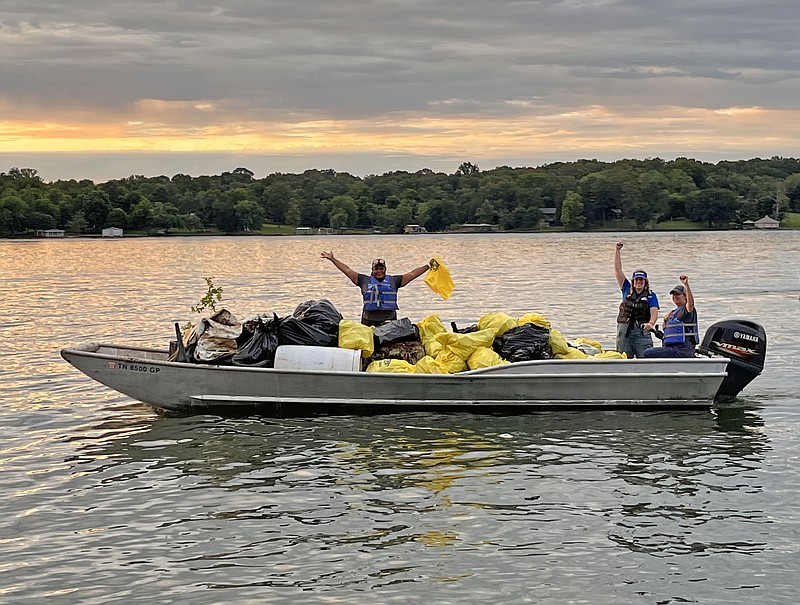Fifty-two years after being called the dirtiest city in America, Chattanooga once again found its name on a list of the country's dirtiest cities this week.
It was 102nd.
The Lawn Starter survey placed the Scenic City below Memphis (25th) and Knoxville (64th) among the nation's dirtiest and above Murfreesboro (105th) and Nashville (127th) -- meaning they're slightly less dirty -- in a list of 152 cities.
Among the categories used to determine the ranking, Chattanooga was 101st in pollution, 139th in living conditions, 33rd in infrastructure and 106th in consumer satisfaction.
It was pollution from the city's manufacturing plants that gave it the "dirtiest" designation, which was reportedly proclaimed by CBS anchor Walter Cronkite during an October 1969 newscast. But the designation also came from the federal Department of Health, Education and Welfare (HEW), which called it the "worst city in the nation for particulate air pollution."
The newly inaugurated Nixon presidential administration had determined at the time it would require metropolitan areas to meet standards of air pollution, and Chattanooga wasn't even in the ballgame.
Cities were to have a maximum of 80 micrograms of suspended particulate per cubic meter of air per year, but the city's rate only a year earlier had been 160 micrograms.
(The standards were based on a 1961-1965 HEW study that showed the city was the worst of 60 cities in the average of all its suspended particulate zones.)
Chattanooga "will have a lot of work to do in order to accomplish this goal," John Allen Carter, director of the local air pollution control bureau, said at the time.
By 1975, a Chattanooga Free Press article referred to the city no longer being "the dirtiest city in America." But there was still work to do.
The 1990 Federal Clean Air Act required Tennessee to develop more restrictive regulations to control air pollution from mobile sources in counties which were not meeting federal air quality standards, and Hamilton County's air quality in 2004 did not meet the standards.
Because it did not meet those standards, Hamilton was one of a handful of Tennessee counties directed to require emissions testing of its vehicles beginning in 2005.
By 2018, though, the air quality had improved enough that state Sen. Bo Watson, R-Hixson, and then-state Rep. Mike Carter, R-Ooltewah, filed legislation to end emissions testing. Approved by the Environmental Protection Agency in August 2021, the testing ended in January 2022.
Today, at least according to Lawn Starter's "dirtiest" metrics, the city is rated worst for its infrastructure, which is compiled from the city's standing in tons of waste in landfills per 100,000 residents, rating of state waste regulations and measures, refuse and recycling collectors per 100,000 residents, alternative fuel stations per 100,000 residents and number of junkyards.
The infrastructure metrics aren't broken down by city, so it's impossible to determine on which of the above measures it ranked the city poorly.
We see one of the biggest problems in "infrastructure" as the city's and county's inability to recycle as much plastic as is picked up by recycling trucks or thrown in recycling bins. It's a problem Chattanooga Mayor Tim Kelly says the city is working on.
"I count myself as fortunate to be mayor of a city where people care deeply about limiting waste and litter," he said at a 2021 Startup Week event in which the city was to partner with CO.LAB to invite local entrepreneurs and the public to share their ideas and innovations to help the city become a zero-waste community.
Kelly, in an editorial board meeting Thursday with Times Free Press editors and reporters, said the search for a public works director has hampered any recycling innovations, but he still feels with the help of local industry partners some solutions can be found.
Though the Lawn Starter survey placed Chattanooga as 106th in consumer satisfaction (which includes the share of residents who find the city dirty and untidy, the share of residents dissatisfied with pollution, the share of residents dissatisfied with garbage disposal and the share of residents dissatisfied with greenery and parks), anecdotal reports on how trashy the city is have begun to increase.
It's something Kelly says he's heard and on which the city is working.
A 2022 Earth Day cleanup was a start, he said, but he could foresee an effort to ask residents to participate in ridding trash from their community on a quarterly basis.
"The simpler solution," Kelly said, "is don't throw things out the [car] window."
But the return to roadside litter pickups after the pandemic, litter sweeps in specific neighborhoods, signs noting piled-up trash could result in a code violation, and neighborhoods requesting trash bins are ways administration officials say the problem is being, and can be, headed off.
And how Chattanooga can keep dropping down any list of the country's dirtiest cities.
